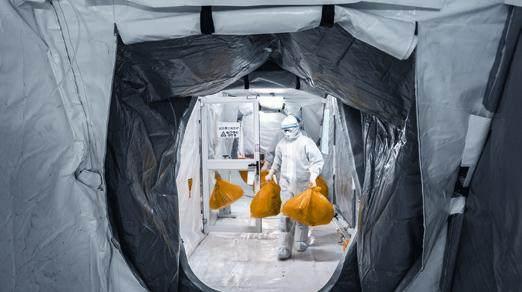Why China’s Government Succeeds
2022-02-26ByHarveyDzodin
By Harvey Dzodin

The great revolutionary and philosopher Thomas Paine wrote on the eve of the American Revolution in 1776 that “these are the times that try men’s souls.” He might as well have been talking about the global challenges mankind faces today.
The latest edition in the two-decade annual series of the globally fielded Edelman Trust Barometer (ETB), an annual survey of trust and credibility in four major institutions—government, business, media and non-governmental organizations, provides some answers to which nations are meeting today’s existential challenges. And which are not.
While U.S. President Joe Biden and his allies have been banging their drums about the superiority of democracy versus autocracy, even hosting a “summit for democracy”last December and calling the defense of their versions of democracy “the defining challenge of our time.” They should take some time out to read the widely respected ETB report which proves that democracy, where the people rule, comes in many forms. The Chinese whole process version is running rings around most others, especially compared to the U.S.
Even prior to COVID-19, survey data repeatedly demonstrated that the Communist Party of China (CPC) had gradually earned the trust of the nation to deliver on its promise to serve the people. Over the past two years, their trust level has actually risen as the CPC crushed the epidemic outbreak and is keeping it at bay. In the U.S. and most other countries, the picture’s slightly gloomier.
In terms of general trust, Edelman asked respondents in 27 countries to indicate how much they trusted their country’s four institutions to do“what is right.” In the latest ETB, China came in first with 83 percent, up 11 percentage points from that in the 2021 report. The U.S. scored 43 percent, down 5 percentage points year on year and a 10-percentage-point drop from 2017. The trust level divergence between both countries has never been greater.
The biggest discrepancy across the board was that of respondent trust in their respective governments, 91 percent for China and 39 percent for the U.S. Next up was domestic media, with Chinese respondents displaying a trust level of 80 percent, an increase of 10 percentage points from 2021, whereas in the U.S., this number stood at 39 percent, down 6 percentage points from last year.
The Biden administration has frequently, and falsely, accused China of not participating in the rules-based international order. Yet, according to objective ETB facts, it is the U.S. that doesn’t trust global organizations. Trust in the United Nations proved highest in China—at 85 percent, but in the U.S., this was 48 percent. This represented a 12-percentage-point increase year on year in the former, but a decrease of 6 percentage points in the latter. Similarly, for the UN’s World Health Organization, the epicenter of the global COVID-19 battlefield, China’s trust level was highest at 87 percent, an 8-percentage-point increase year on year. The U.S. level was 49 percent, a 5-percentage-point decrease year on year.
We’ve known [at least] since the 2016 presidential race between Hillary Clinton and Donald Trump that the U.S. political system is broken. The ETB data further confirmed this. Whereas Clinton received almost 3 million more popular votes than Trump, an archaic and unrepresentative American voting regime led Trump to victory. ETB data further confirmed the fatal flaws: Democrats had an overall 55-percent trust score, but Republicans 35 percent. Regarding trust in government, the former had a 53-percent score, but the latter only 29 percent. On the topic of media, Democrats came in with 55 percent, but Republicans with 24 percent.
Are ETB data credible? Yes. Edelman is held in high regard and has 20 continuous years of experience in perfecting survey methodology under its belt. More importantly, the results are consistent with recent polls conducted in both China and the U.S.
A long-term study released in 2020 by Harvard’s Kennedy School of Government examined the relationship between Chinese citizens and the CPC from 2003 to 2016. The study found a near universal rise in average satisfaction toward all levels of the Chinese Government over this period based on more than 31,000 interviews in both urban and rural areas. For example, in 2016, 93.1 percent of respondents were “relatively satisfied” or “highly satisfied” with their government’s performance, a 7-percentage-point increase from 2003.
Focusing on the COVID-19 crisis, the Chinese public’s approval of its government’s successful efforts to contain the mutating virus is similar. In an anonymous April 2020 national survey of nearly 20,000 Chinese citizens, as the virus was subsiding in China but exploding elsewhere, more than 90 percent of respondents said they were satisfied with how China’s national leaders had managed the outbreak. Nearly half reported an increase in government trust level. In charge of the massive undertaking was Professor Cary Wu from Canada’s York University who said,“Surprisingly, [the epidemic] actually increased people’s satisfaction with and support for their government.”
This study was corroborated by one completed a month later by the China Data Lab at the University of California in San Diego, the U.S. This one, too, showed a steady rise in the Chinese public’s trust of their leaders during the previous year.
On the American side, many surveys illustrate a decline in government trust, starting with Trump’s botched “leadership” on containing COVID-19 from January 2020 onward. Even today, the American public finds fault with Biden’s efforts. A recent poll by YouGov, a global public opinion and data company, found 64 percent to be unhappy with his management of the virus, with only 36 percent of respondents believing the government’s efforts are “going well.”
Why this contrast between China and the U.S.? The American system is broken, divided into two enemy tribes playing a zero-sum game. The country is still largely racist, and Republicans are doing everything they can to ensure electoral victory, knowing full well that if elections were really based on one person, one vote, they would lose. Moreover, rather than promoting common prosperity as China does, both parties cater to the elite 1 percent.
China, on the other hand, features a tried and tested, continually honed system that works. Successive five-year plans receiving input from all stakeholders, together with the CPC’s system of promoting only competent and honest cadres who are given ever-increasing real world experience, have not only subjugated COVID-19, but eliminated extreme poverty and made China the world’s second largest economy.
Jimmy Carter, the U.S. president in whose administration I served, said at his inauguration in Washington almost exactly 45 years ago that“the best way to enhance freedom in other lands is to demonstrate here that our democratic system is worthy of emulation.” By this measure, ETB data demonstrate the U.S. is falling further behind China.
Biden speaks lofty words but only results can meet Carter’s test or the one proposed two millennia ago by Cicero, the great Roman statesman, scholar and philosopher: Salus populi suprema lex esto (The welfare of the people shall be the supreme law). Maybe Chairman Mao Zedong said it most concisely in 1944: “Serve the people.”That’s exactly what China is now doing and the U.S. isn’t. BR
